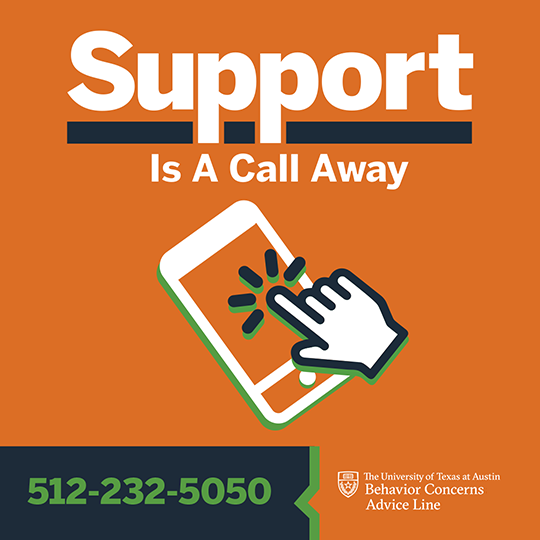Behavior Concerns
If you're concerned about a student, faculty, or staff member, our office wants to help. Below are some tips on how to work with someone in distress. Also, anyone can go to the Behavior Concerns Advice Line (BCAL) website or call BCAL at 512-232-5050 to express concerns about UT faculty, staff, students, and visitors. BCAL is available 24/7 and callers can choose to be anonymous.
Situations that present an immediate threat to persons or property are considered emergencies and should be directed to the University of Texas Police Department (UTPD) at 911.
How to Tell if Someone Needs Help:
- Screaming, yelling or crying
- Persistent, unreasonable demands
- Disruptions to the classroom or office
- Repeated or prolonged absences from class or work
- Sudden or extreme changes in behavior
- Threats of violence toward self or others
- Intimidating words or actions
- Confusion or disorientation
- Dramatic changes in personal appearance or hygiene
- Suicidal warning signs
How to Help Someone in Distress
Do:
- Be firm, consistent and honest
- Use active listening; allow the person to share concerns without judgment
- Report your concerns immediately
- Make appropriate referrals when applicable
Don't:
- Minimize the situation of the person's feelings
- Get into a debate, argument or shouting match
- Promise confidentiality
- Ignore unusual behavior
- Judge or criticize
Language You Can Use:
- "You must be very frustrated by..."
- "This behavior is not acceptable in my class/office."
- "I am willing to speak with you when you lower your voice."
- "The best way for me to assist you is to connect you with those more skilled at addressing this type of concern."
- "I know some great people in____ (e.g., Student Outreach and Support, Office of the Dean of Students, the Counseling and Mental Health Center, University of Texas Police Department) who are easy to work with and would be very helpful to you right now. Would you like me to call and see if they can meet with you? I am happy to walk over with you."
- "Our conversation can be private but not always confidential. I may need to share information with other university officials, and I will keep you informed about what information I share and with whom."
What to Watch for / Levels of Concern
Low Level of Concern


Specific Behaviors
- Excessive eye rolling
- Constant interruptions
- Irrelevant discussions
- Violating classroom rules


Assessing the Situation
- No direct threats
- No previous concerns regarding this person
- Makes others uncomfortable but nothing specific


Who to Call
- Behavior Concerns Advice Line (BCAL): 512-232-5050
Moderate Level of Concern
Specific Behaviors
- Interference in others' learning or work duties
- Continuation of low-level behaviors even after addressed
Assessing the Situation
- Implied or vague threat, such as "You'll be sorry" or "I don't care if I live any longer"
- Not the first time I have had a concern regarding this person's behavior
- Threat through verbal or electronic medium
Who to Call
- BCAL: 512-232-5050
- Student Conduct and Academic Integrity: 512-471-2841
High Level of Concern
Specific Behaviors
- Threatening and posturing in an intimidating manner
- Hate incidents
- Active violence
Assessing the Situation
- Clear direct and specific threat to hurt self and / or others
- Multiple lower-level concerns
- Access or potential access to weapons
- Multiple incidents
Who to Call
- UTPD: 911
- Follow up later with BCAL (and Student Conduct and Academic Integrity if warranted)
Commitment to Student Privacy (FERPA)
Our office respects a student's right to privacy, and therefore, cannot provide information restricted by the Family Education Rights and Privacy Act (FERPA). FERPA is a Federal law that protects the privacy of student educational records and gives students (over the age of 18 or attending an institution of higher education) the right to access and correct their records. Other than directory information, information contained in the educational records cannot be shared without the students' written consent.




